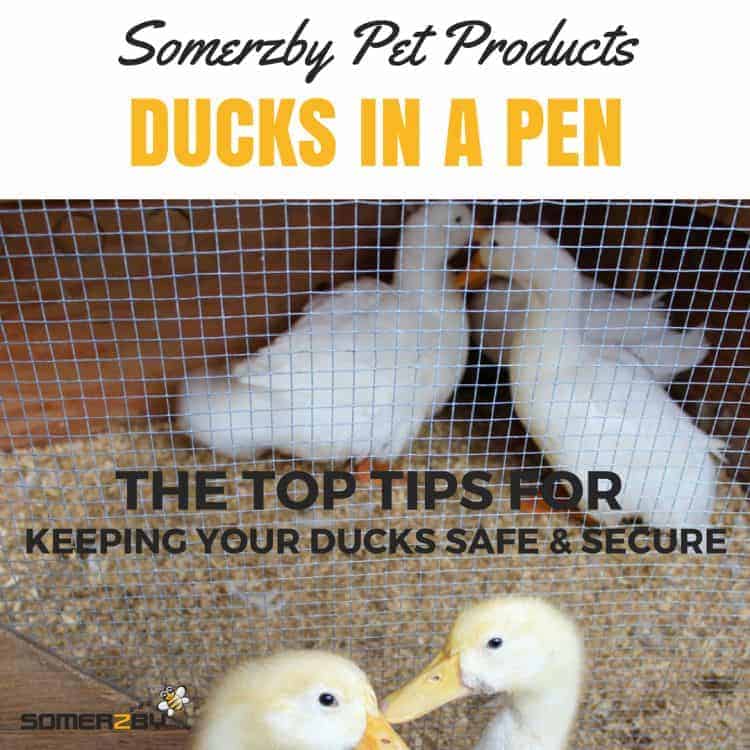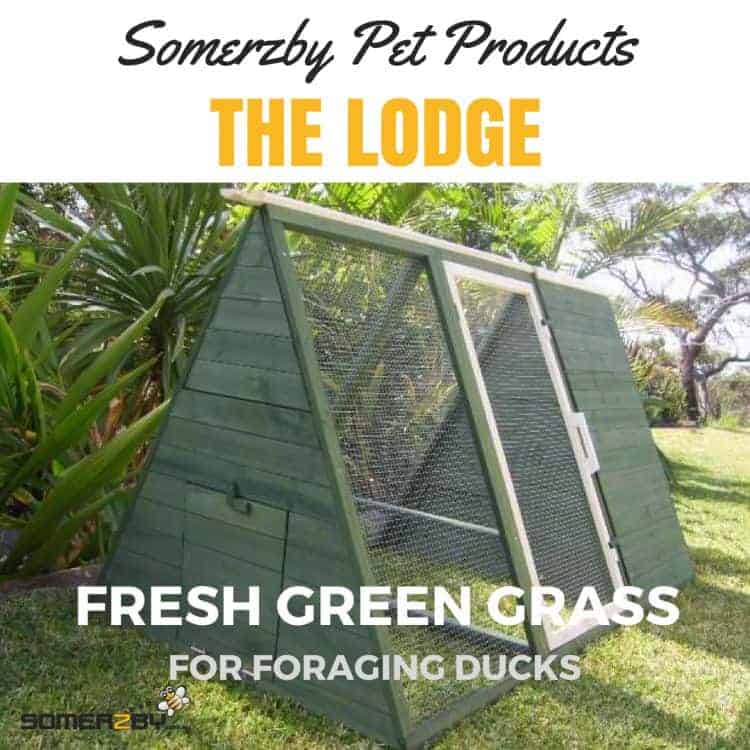Ducks
Duck Pens, Keeping Your Ducks Safe in the Backyard
Keeping Ducks in a Duck Pen
Ducks make great pets with their wonderfully funny and unique personalities.
They are relatively easy to keep and can be a great help around the garden with their voracious appetite for slugs, snails, and other pest insects.
Some duck varieties are good egg layers and others serve as fine tasting table birds.
Ducks are becoming increasingly popular as pets even in suburban areas and for many chicken owners ducks seem like the next logical step.
Their needs are a little different to chickens especially around housing and so you need to do your homework.
Somerzby have a number of large chicken coops suitable to use as the starting point for your new duck pen.
What are the Laws about Keeping Ducks in Australia?
For the most part laws regarding the keeping of ducks in suburban areas are very similar to those for keeping chickens.
In most States you can keep between 3 and 6 ducks on sections of 600m in size or larger without needed to obtain a council permit.
Ideally, it’s best if you keep at least 3 or 4 ducks because of their highly social natures.
However, you should always check with your local council for the rules that apply in your area.
The usual requirements still apply including the need to:
- Prevent your ducks escaping
- Keep enclosures clean and hygienic
- Maintain required distance between your duck enclosure and neighbouring boundaries
- Prevent any human health hazard or inconvenience or disturbance to neighbours
All councils have set size limits which duck houses must not exceed. It’s also worth remembering that some duck species quack and make more noise than others so think about your neighbours when choosing your duck variety.

Top Tips for Keeping Ducks in a Pen
Provide at least 0.5m2 in the sleeping area per duck and around 1.5m2 per duck for daytime foraging etc. in an enclosed run.
Do not place duck pens over hard surfaces such as concrete as this will damage their feet and potentially cause long-term health issues such as joint problems and arthritis.
Ducks can be quite a bit larger than chickens so make sure the access door into the duck coop is large enough.
Ducks love to splash water around when drinking and eating so keeping food and water in separate areas will help keep the hutch dry and clean.
Placing the water dispensers above an area with good drainage (pebbles, gravel or a small tiled area with drainage channels) will go a long way to keeping the duck coop dry.
Provide clean dry litter and change regularly (once a week) because the build-up of excrement will quickly turn the duck house into a very damp, smelly and unsanitary area. Good choices for litter are straw, leaves or wood chips
Ensure there is good ventilation through the duck coop to help remove odour and dry out dampness.
It is important to site the hutch so that it is sheltered from direct exposure to wind.
Ducks can quickly overheat and develop heat stress so make sure the hutch is shaded from all-day direct sun especially in summer.
In the winter try and position the hutch so that the openings face the winter sun yet remain sheltered from the chilly, wet southerly winds.
It’s often a good idea to put down a layer (around 8 to 10 cms) of coarse sand in the outside run to help reduce the scale of the usual mud bath in the wetter months.
How to Make a Duck Pen
You need to prevent your ducks from escaping and also keep them safe from predators with a secure wire duck pen or enclosure.
The simplest way to create a perfect duck pen or run is to combine one of the Somerzby chicken coops with a large enclosed run.
Ducks don’t usually roost on perches so you’ll probably want to remove these for extra space.
The following Somerzby products work well for ducks:

Bungalow Duck Pen
The Bungalow provides all the comfort, security, and weather protection your ducks need. Measuring 104cm H x 187cm W x 81cm D, the Bungalow is ideal for a couple of ducks.
Galvanised mesh protects your ducks from predators and also provides excellent ventilation.
Additional ventilation comes through the large mesh covered window.
A good sized ramp and door allows your ducks easy access to the sleeping area.
Other features include:
- Rot resistant Fir timber protected by a water-based non-toxic stain
- Easy access door to sleeping area
- Waterproof asphalt roof
- Galvanised tray slides out for easy cleaning

Cottage
The cottage boasts very generous measurements with an overall length of 1860mm x 840mm high. Mesh covered window provide good airflow through the hutch.
The run measures 1260mm L x 520mm H x 660mm W and the wire mesh sides and roof protect your ducks from other pets and predators.
We also have the Deluxe Cottage that has metal fly screens on the wire panels and a wire floor for fox protection.
If your ducks are going to spend a lot of time in the Deluxe Cottage run it might be a good idea to cover the wire floor with leaves or straw to protect their feet.
Features include:
- Solid wooden construction– rot resistant Fir wood
- Non toxic water based stain –highly attractive finish
- Galvanised wire mesh keeps your ducks in and predators out
- Easy access provided by two large access doors
- Stainless steel tray slides out for easy cleaning

Lodge Duck Pen
Ducks enjoy foraging in the grass but if left too long in one place they will quickly turn the lawn into a mud bath.
You will need to move them regularly on to fresh grass.
The Lodge is the perfect solution for when the grass is greener on the other side of the fence.
One person can easily move the Lodge to fresh grass areas thanks to the wheels and convenient handles.
This will give your lawn a chance to recover and provide your ducks with the greenery they love to munch on.
The nesting area has a galvanised metal floor and although the floor doesn’t slide out it is removable for cleaning.
The Lodge also features:
- Easy access doors at both ends and on the side
- Green and white stained fir—long-lasting
- Good ventilation

Mansion Large Extension Run
This large extension run measuring 3m gives your ducks even more space.
It’s designed to attach easily to a number of the Somerzby duck coops or can be used as a standalone run.
What Do Ducks Eat?
Ducks like a similar diet to chickens: grains, mash (wheat, barley, oats plus milk), and grit. Ducks will require some 50 to 80% more food than chickens.
They also like a daily helping of fresh green vegetables. Make sure any vegetable scraps such as chunks of carrot are cut up very finely because ducks cannot break up the hard lumps and they could choke on them.

Ducks and Water
Ducks love water but it is not essential that they have a large pond.
However, they will love you if you can provide a small pool (at least 20cm deep) where they can do duck dives, duck paddle, wash out their beaks, and all the other things that ducks love to do in the water.
The trouble is ducks will transform their clean water into little short of a mud bath in very short order.
It helps if you can place their pool on top of a raised wire frame.
This helps prevent the ground immediately around the pool becoming a real mud bath.
Some people use small paddling pools or kiddie pools for their ducks and these work well but remember that you are required to provide adequate safety fencing for even quite small pools.
This is a legal requirement throughout Australia and there are heavy fines if you neglect this aspect of water safety.
You do need to provide drinking water (about 1L per day per duck) and it’s best if you can provide this in a separate drink dispenser that prevents the ducks swimming in and fouling their drinking water.

Ducks and My Vegetables
Ducks can be helpful in the veggie garden as they will devastate the snail and slug population. Ducks don’t scratch around like chickens do but they can still flatten and damage young plants.
They will also love your spinach and other green leaved vegetables so it’s best to keep them away from certain areas of your veggie patch.
Also keep them out of the veggie garden after the rain or when you’re watering the garden or turf as they love to drill holes in the soil with their beaks as they forage.
Picture Gallery
Duck varieties such as Pekin, Cayuga, and Indian Runner are ideal for hot tropical climates but will also be fine further south.
If you live in a much colder climate Campbell, Rouen or Aylesbury make a good choice.
Duck eggs tend to be quite a bit bigger and richer than chicken eggs. Egg shells are also usually harder.





How can I buy a duck pen from you?
Hi Teresa,
You can purchase any of our products via our website. Let me know if you need any assistance.
hello
i need a small duck coop.in macedon 3440
How much is the Bungalow duck pen
Hi I need a duck coop
Hi Ray,
Many of our chicken coops are suitable for ducks too. How many ducks were you planning on keeping?
Hi Toni
Looking to spread grass seeds in the backyard in Sydney which have my two duckies stomping around like legends.. could you tell me a hardier or longer rooy grass/ground cover there might be less of a chance of them hammering through? Thanks Al